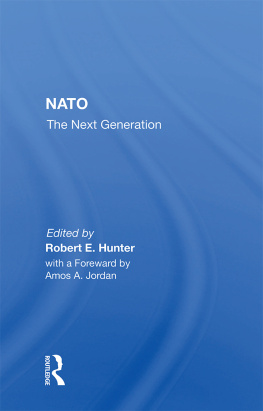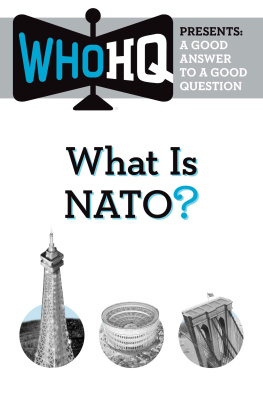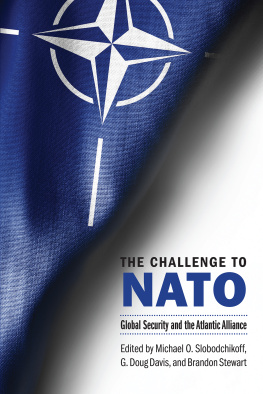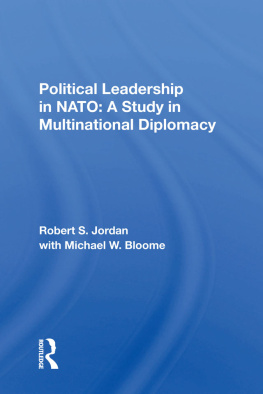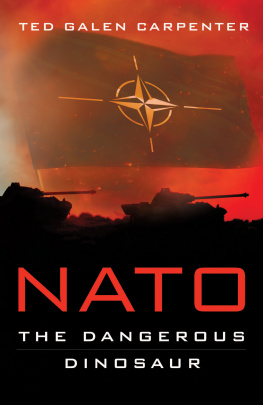NATO The Next Generation
Also of Interest
NATO The Next Thirty Years: The Changing Political, Economic, and Military Setting, edited by Kenneth A. Myers
The Future of European Alliance Systems: NATO and the Warsaw Pact, edited by Arlene Idol Broadhurst
The Birth of NATO, Sir Nicholas Henderson
Political Leadership in NATO: A Study in Multinational Diplomacy, Robert S.Jordan
Nonstate Actors in International Politics: From Transregional to Substate Organizations, Phillip Taylor
The Defense of the West: Strategic and European Security Issues Reappraised, edited by Robert Kennedy and John M. Weinstein
Europe and the Superpowers: Economic, Political, and Military Relations, edited by Steven Bethlen and Ivan Volgyes
The European Community in World Affairs: Economic Power and Political Influence, Werner J. Feld
* Foreign Policies of Northern Europe, edited by Bengt Sundelius
Available in hardcover and paperback.
*Available only in paperback:
About the Book and Editor
NATOThe Next Generation
edited by Robert E. Hunter
If NATO is to meet the needs of its sixteen members over the next several decades, it must address issues that go far beyond deterrence and defense: How can consensus be reached on NATO's future? How can public perception of the organization be gauged? How can NATO sustain and bolster worldwide political and economic support? NATO's interests are no longer limited to Western Europe; the Gulf has become a critical area, and Japan and other non-European nations now play a major role in Western security. In this book, composed of keynote speeches and papers delivered in Brussels at the conference on "The Future of NATO and Global Security," a diverse group of distinguished experts and political leaders from Western Europe, the United States, and Japan analyze current problems facing the Western Alliance and consider potential courses of action for the future.
Robert E. Hunter is director of European studies at the Center for Strategic and International Studies at Georgetown University. He directed the CSIS conference on which this book is based.
Published in cooperation with
The Center for Strategic and International Studies Georgetown University
Washington, D.C.
Nato
The Next Generation
edited by
Robert E. Hunter
with a Foreword by
Amos A. Jordan
First published 1984 by Westview Press
Published 2018 by Routledge
52 Vanderbilt Avenue, New York, NY 10017
2 Park Square, Milton Park, Abingdon, Oxon OX14 4RN
Routledge is an imprint of the Taylor & Francis Group, an informa business
Copyright 1984 by The Center for Strategic and International Studies.
All rights reserved. No part of this book may be reprinted or reproduced or utilised in any form or by any electronic, mechanical, or other means, now known or hereafter invented, including photocopying and recording, or in any information storage or retrieval system, without permission in writing from the publishers.
Notice:
Product or corporate names may be trademarks or registered trademarks, and are used only for identification and explanation without intent to infringe.
Library of Congress Cataloging in Publication Data
Main entry under title:
NATOthe next generation.
Contains keynote speeches and papers delivered in
Brussels, January 12 to 14, 1984, at the Center's con
ference on the future of NATO and global security.
1. North Atlantic Treaty OrganizationCongresses.
I. Hunter, Robert Edwards, 1940- . II. Georgetown
University. Center for Strategic and International
Studies. III. Title: NATOthe next generation.
UA646.3.N2464 1984 355'.031'091821 84-21935
ISBN 13: 978-0-367-00588-7 (hbk)
Contents
, Amos A. Jordan
, Robert E. Hunter
, Henry A. Kissinger
, Helmut Schmidt
, James R. Schlesinger
, Jean Franois-Poncet
, Etienne Davignon
, David M. Abshire
, Leo Tindemans
, William G. Hyland
, Richard Davy
, Bunroku Yoshino
, Thierry de Montbrial
, Franz-Joseph Schulze
, Robert W. Komer
, Lawrence Freedman
, James A. Thomson
, John E. Rielly
, Otto Hauser
, Dominique Mosi
, Catherine McArdle Kelleher
, Jun Tsunoda
, Shunji Taoka
Since its founding more than two decades ago, the Center for Strategic and International Studies (CSIS) of Georgetown University has sought to play a special role in international affairsboth to analyze and make policy recommendations about the vital foreign and defense issues of the times and to provide a meeting place for individuals in government, business, labor, and the academic community, from the United States and abroad. CSIS seeks to be a bridge between all these groups, bringing together the insights and knowledge of all for mutual benefit.
At CSIS we have been particularly concerned about the future of the Western alliance as a cornerstone of U.S. foreign policy and a vital component of global peace and security. Aware of the increasing challenges to the alliancefrom within and withoutwe convened a major international conference on "The Future of NATO and Global Security" at the Palais d'Egmont in Brussels from January 12 to 14, 1984. The conference, a sequel to one that CSIS convened in Brussels five years earlier, was chaired by former U.S. Secretary of State Henry A. Kissinger, hosted by Belgian Foreign Minister Leo Tindemans, and cochaired by former West German Chancellor Helmut Schmidt and U.S. Senator Sam Nunn. More than 200 leaders in government, business, academia, and the media took part, representing more than 20 countries in North America, Western Europe, and East Asia.
In this book we present the fruits of their collective labors. It includes several major addresses by world figures (also published separately by Westview Press under the title Grand Strategy for the Western Alliance ) and a series of articles on key issues facing the alliance, both now and in the future, written by outstanding experts from three continents, who presented earlier versions at the conference.
We believe that the conference and these presentations are particularly valuable for three reasons: They cover the gamut of alliance problems and prospectsfrom military issues and economics to the role of Japan and the impact of public and parliamentary opinion; they vividly demonstrate the wide range of factors that must be dealt with together under the rubric of "security"; and they come at a time when a coalescence of major issues and new thinking has made possible an unusual synthesis of visions and perspectives. We at CSIS hope that the ideas presented here can both help shape the agenda for the alliance and begin to point the way to the future.
As president of CSIS, I wish to express my personal appreciation to everyone who made this conference on "The Future of NATO and Global Security" a successful celebration of NATO's thirty-fifth anniversary. The conference organizers, speakers, authors, panel chairpersons, and participants are listed at the end of this book. We are especially indebted to the Belgian Foreign Ministry and to Foreign Minister Leo Tindemans for their incomparable efforts and support. And we gratefully acknowledge the generous assistance of the following conference sponsors:


